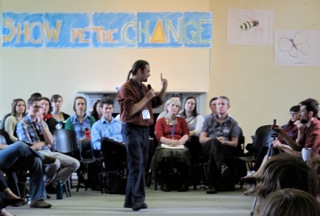In the organisational world, there is a prevailing idea that change is difficult and stressful, and that innovation is scarce and requires effortful management to succeed. Overlay evaluation and is it any wonder we get stuck? 
We’re going to explore how this is reflected in three tyrannies:
- The tyranny of the explicit and the fear of not knowing.
- The tyranny of excellence and the fear of not being good enough.
- The tyranny of effort and the fear of failure.
Once you can recognise these tyrannies and the effects they have on how we work, the next step is to bust them. We’re planning to explore these tyrannies and highlight some ways to bust them with a series of practical and impractical exercises. We’re going to reveal our own prejudices about facilitating change and innovation, which emphasize letting go of the effort to be spectacular in favour of being open to surprise and attentive to small ideas instead of chasing grandiose visions.
These are based on years of wrinkle-inducing experience, and in particular our shared interests in Open Space, improvisation and creativity. With a special nod to Keith Sawyer’s recent book, Group Genius. Keith says, among other things, that “virtually all of the conventional wisdom on creativity and innovation is false”. That has a few implications for behaviour change programs, we think.
Exactly what will happen depends, as always, on who turns up. We can promise a range of verbal, physical (but not difficult), meditative, reflective, amusing and extraordinary activities all designed to help you notice more.
If you go on to use all this to help yourself and others to be more creative, more fulfilled, more beautiful, thinner, richer, healthier, then we’ll be delighted for you. But no pressure.
Oh, and we think this also might help in our understanding of complexity and behaviour change, and even evaluation.
This post-conference workshop will be hosted by Johnnie Moore (UK) and Viv McWaters (Australia).
 Johnnie Moore started his career as a speechwriter to Lord Sainsbury before working in advertising. After many years of successfully dressing mutton up as lamb, he became a facilitator working for a wildly varied array of clients from big fat corporates to small charities and all shades of organisation inbetween. He has worked with clients such as Johnson & Johnson, National Public Radio, O2, PwC, The Clore Leadership Programme, NESTA, American Express, the BBC and Channel 4.
Johnnie Moore started his career as a speechwriter to Lord Sainsbury before working in advertising. After many years of successfully dressing mutton up as lamb, he became a facilitator working for a wildly varied array of clients from big fat corporates to small charities and all shades of organisation inbetween. He has worked with clients such as Johnson & Johnson, National Public Radio, O2, PwC, The Clore Leadership Programme, NESTA, American Express, the BBC and Channel 4.
Viv McWaters has dabbled in journalism, community education, science and improvisation, which makes an ideal platform for her current career as a facilitator.She works with people to tap into their creativity and leadership potential, and has worked in places as diverse as Armenia and Zambia.
Register here for this post conference workshop.
 As I sit here it’s mid-afternoon on the first day on the long-anticipated Show Me the Change Conference. About 180 people have gathered in Melbourne to explore topics and pose questions, share ideas and tools around evaluating behaviour change. I’ve met people with a wealth of experience and others bring new enthusiasm; there’s conversations of all shapes and sizes; there’s the usual challenges of working in large groups.
As I sit here it’s mid-afternoon on the first day on the long-anticipated Show Me the Change Conference. About 180 people have gathered in Melbourne to explore topics and pose questions, share ideas and tools around evaluating behaviour change. I’ve met people with a wealth of experience and others bring new enthusiasm; there’s conversations of all shapes and sizes; there’s the usual challenges of working in large groups.
 Johnnie Moore started his career as a speechwriter to Lord Sainsbury before working in advertising. After many years of successfully dressing mutton up as lamb, he became a facilitator working for a wildly varied array of clients from big fat corporates to small charities and all shades of organisation inbetween. He has worked with clients such as Johnson & Johnson, National Public Radio, O2, PwC, The Clore Leadership Programme, NESTA, American Express, the BBC and Channel 4.
Johnnie Moore started his career as a speechwriter to Lord Sainsbury before working in advertising. After many years of successfully dressing mutton up as lamb, he became a facilitator working for a wildly varied array of clients from big fat corporates to small charities and all shades of organisation inbetween. He has worked with clients such as Johnson & Johnson, National Public Radio, O2, PwC, The Clore Leadership Programme, NESTA, American Express, the BBC and Channel 4. We’re having our conference dinner at the
We’re having our conference dinner at the